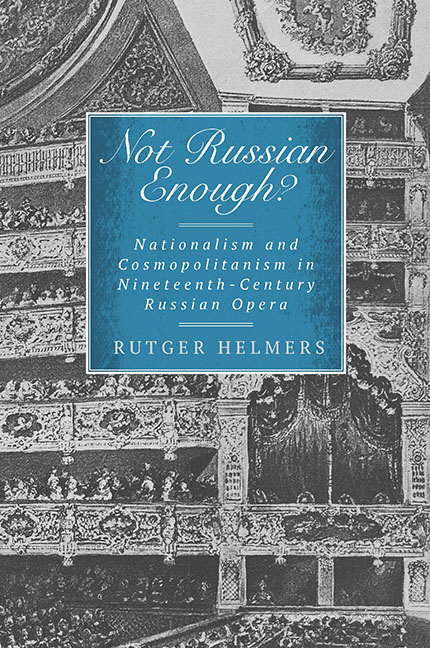Book contents
- Frontmatter
- Dedication
- Contents
- List of Illustrations
- Acknowledgments
- Editorial Notes
- Introduction: The Part and the Whole
- A Life for the Tsar and Bel Canto Opera
- Subject Matter, Local Color, and National Style in Judith
- French Theatricality and Inadvertent Russianisms in The Maid of Orléans
- The Tsar's Bride and the Dilemma of History
- Conclusion
- Abbreviations
- Notes
- Bibliography
- Index
Conclusion
Published online by Cambridge University Press: 15 March 2018
- Frontmatter
- Dedication
- Contents
- List of Illustrations
- Acknowledgments
- Editorial Notes
- Introduction: The Part and the Whole
- A Life for the Tsar and Bel Canto Opera
- Subject Matter, Local Color, and National Style in Judith
- French Theatricality and Inadvertent Russianisms in The Maid of Orléans
- The Tsar's Bride and the Dilemma of History
- Conclusion
- Abbreviations
- Notes
- Bibliography
- Index
Summary
In an obituary for Balakirev written in 1910, the modernist critic Vyacheslav Karatïgin pointed out “denationalization” as one of the important new trends in Russian music. He singled out Aleksandr Skryabin (1872–1915), the most promising and path-breaking Russian composer of the day, as a contemporary who had left “the nationalistic passions of the New Russian School” far behind him. Karatïgin's representation of Russian music history—an epoch dominated by the Kuchka followed by a post-Kuchka phase led by Skryabin—was overly schematic, but the critic rightly perceived that interest in national distinctions among composers was waning. The number of new Russian operas on non-Russian subjects, which amounted to roughly one out of four works from Glinka's time to 1880, rose to about half of the output in the final decades before the revolution, and included works like Tchaikovsky's Iolanta (1892), Arensky's Raphael (1894), Taneyev's Oresteia (1895), César Cui's The Saracen (1899), Rimsky-Korsakov's Servilia (1902), and Rachmaninov's Francesca da Rimini (1906).
Opera had been losing its central importance for composers since the time of the Belyayev circle, when composers like Glazunov and Lyadov established themselves without producing any operas. In Russia as elsewhere, the repertoire was aging rapidly: the percentage of works by living composers on the imperial stages dropped dramatically—from 50 percent in 1890/91 to 15 percent by 1910/11. When young Sergey Prokofiev shared his first ideas for an opera on Dostoyevsky's The Gambler with Sergey Diaghilev in 1914, he was told that opera was a dying form; he should compose a ballet, instead.
Ironically, it was precisely at the time Karatïgin was writing that the fruits of the previous decades of national distinction were finally making their breakthrough in the West. Diaghilev was just beginning to present Russian works as exotic spectacles in France, introducing works of the Kuchka on Parisian stages and commissioning new ballets from Igor Stravinsky for that purpose.
The success of composers like Stravinsky and Prokofiev abroad marked a new age for Russian music, and the problems it produced in historiography were of a wholly different kind. Stravinsky's works have often been considered an integral part of Western music history that needed little reference to nineteenth-century Russian traditions.
- Type
- Chapter
- Information
- Not Russian Enough?Nationalism and Cosmopolitanism in Nineteenth-Century Russian Opera, pp. 153 - 160Publisher: Boydell & BrewerPrint publication year: 2014



